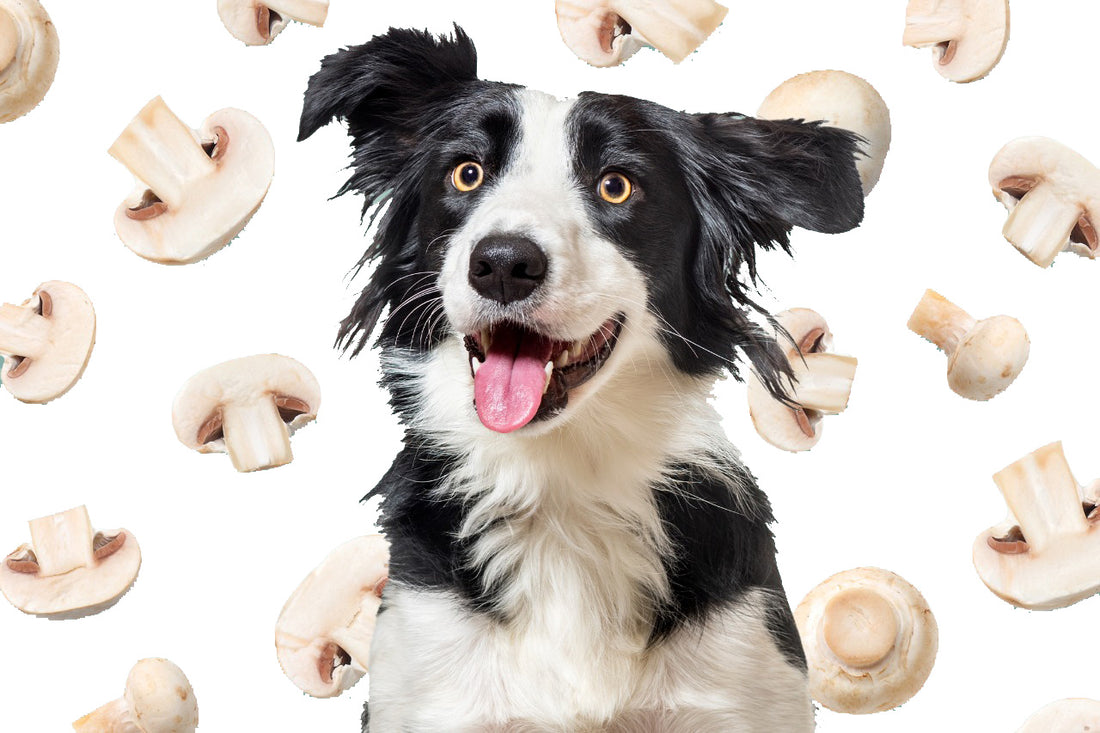In your role as pet parents, you continuously search for information to make sure that your pets are healthy and secure. You know that for your furry friends -chocolate, grapes and roasted bones are not so good. But, there are a couple of other foods that are usually overlooked when you are choosing the right food for your dog, and one such food is Mushroom. So, let’s discuss Are Mushrooms Good for Dogs and Can Dogs Eat Mushrooms?
Mushrooms are available in abundance in nature. They grow throughout the year and are plentiful in the fall months. They appear all over the garden areas, in and around the vegetation and trees.
There are many foods that are healthy and safe when given in moderation and not all forms are safe for consumption by your dog, and mushrooms are one such food that you should be careful about when adding to dog food.
Most mushrooms sold in the market, for human consumption, are safe for your furry friend too, but in the wilderness, there are many mushroom species that are potentially dangerous for your dog. You should be particularly vigilant when taking your dog for a walk or trekking in areas where mushrooms are found in abundance.
As a pet parent, it is important for you to understand which mushrooms are harmful for dogs and which are the mushrooms can be part of the dog food!
Some Mushrooms are Dangerous for dogs
Mushrooms are a bit mysterious. Many kinds of mushrooms that are available in the market are quite safe for consumption. There are some mushrooms that can be fed in small amount without any damage. However, there are a few types of mushrooms, especially the ones that grow in the wild, that are extremely dangerous for dogs.
Mushrooms grow best in warm and humid conditions. They can grow naturally in grassy parks, wooded areas, rocky terrain and even in your backyard if the temperature and weather conditions are right.
So, unless you have absolute knowledge of wild mushrooms, it is important that you always handle any wild mushroom consumption by your dog as dangerous and contact your vet as soon as possible to make sure that the treatment begins at the earliest.
Are Mushrooms Poisonous For Dogs?
Yes, some mushrooms are very poisonous for dogs.
Toxicity from Amanita species of mushrooms is the most prevalent kind of recorded mushroom poisoning in dogs. Arguably the most iconic of the toadstool mushrooms, they are usually red mushrooms with white spots and gills. Dogs are known to be drawn to members of this species of mushrooms because they have a fishy smell.
Amanita mushrooms cause poisoning in both humans and dogs and can cause serious life-threatening conditions due to mushroom toxicity in dogs.
Besides, Amanita mushrooms, there are many other varieties of mushrooms that are very dangerous for dogs. So, unless you are a mushroom expert, it is best to assume every wild mushroom to be dangerous and best to avoid.
The severity of mushroom poisoning depends on the type and number of mushrooms eaten by the dog. Sometimes a pet can have mild gastrointestinal (GI) upset that can be resolved at home. At other times, pets become extremely sick and require hospitalization. Unfortunately, some pets die of mushroom poisoning despite treatment and therapy.

Symptoms of Mushroom Poisoning in Dogs
- There are many mushroom varieties that upset the stomach of dogs causing vomiting and diarrhoea. Pets may become ill within 15 minutes of nibbling on these mushrooms, while in some cases the symptoms may be delayed for up to 6 hours.
- Some variety of mushrooms cause respiratory problems and slowing down of heart rate.
- There are some varieties of mushroom that affect the liver in dogs. Amanita Mushroom falls under this category and is extremely deadly. Pets who get liver toxicity due to mushroom become jaundiced, lethargic, weak and can even lose consciousness.
- If your dog eats mushrooms that affect the kidney then symptoms are nausea, vomiting and dehydration.
- There are three main groups of mushrooms that cause neurological signs in dogs like weakness, lack of coordination, tremors, hallucinations, vocalizations, disorientation, agitation, and seizures. The onset of the symptoms is fast and signs can show within 30 minutes to up to 6 hours.
Treatment of Mushroom Poisoning in Dogs
As with most cases of poisoning in dogs, prompt treatment is critical for the health and life of dogs. It is important to ensure that there is minimal absorption of toxins by the body, so treatment should start at the earliest.
If you believe your dog has eaten wild mushrooms, it is best not to wait until the symptoms emerge. Take your pet promptly to the veterinarian to detect the level of toxicity. Early Identification of your dog’s toxicity level and immediate emergency treatments are essential for recovery.
To reduce the amount of toxins that has entered the bloodstream, your veterinarian will induce vomiting to flush the stomach. Gastro Intestinal medicines like activated charcoal is also used to bind the toxins to prevent absorption.
Your pet will also be given intravenous fluids to combat dehydration and flush out all the toxins from the body and to support kidney and liver function.

How to Prevent Mushroom Poisoning in Dogs
Without proper knowledge of mushrooms and its types, it is best to assume that all mushrooms growing in the wild are harmful and should be best avoided. If your dog visits your lawns and other wooded areas around your house unsupervised, then remove all mushrooms in that area.
Mushrooms spring up very quickly, so frequent inspection and removal of mushrooms is important to ensure that your dog does not ingest a poisonous mushroom. It is always better to be safe when it comes to mushroom poisoning in dogs.
Are Store-Bought Mushrooms SafeFor Dogs To Eat?
Most mushrooms that are fit for human consumption are also safe for dogs. So, if you are buying mushrooms from the store for yourself, they can be safely eaten by your dogs too.
Although, mushrooms do have some health benefits for dogs but if your dog is already on a balanced fresh food diet like FurrMeals Ready-to-Eat Fresh Dog Food then you don’t have to bother much about adding mushrooms to your dog’s daily diet. All the vitamins and minerals that you want to obtain through mushrooms are very much available in all the FurrMeals recipes.
Nonetheless, if you have a little more mushroomleft over after your dinner preparation and are wondering if one or two of them can be given to your dog, then please do go ahead and give them to your furry as a treat. However, if your doggo somehow manages to gets into the bag of mushrooms and polishes off a coupletoo many, then a consult with the vet is recommended.
Raw or Cooked – What is the best way to give mushroom to dogs?
Mushrooms are a low-calorie food that is packed with nutrition. Mushrooms are a good source of vitamins, minerals and anti-oxidants, all of which are great for your furry’s health.
Store-bought mushrooms should be cleaned properly and can be served raw as a crunchy snack for your furry. If your furry does not fancy the taste of the raw mushrooms then you can lightly cook the mushrooms and serve.
When serving cooked mushrooms, make sure it is low in calories and contain low sodium levels, have low fat, and are without cholesterol. Lightly sautéed mushrooms can be a great snack for your furry. Make sure to use a good quality coconut oil, olive oil or ghee to sauté the mushroom. Do not add any salt to it. Drizzle some healthy seed powder like flax seed, sesame seed or chia seed for the added boost of omega fatty acids.
Benefits Of Mushrooms For Dogs
Mushrooms are a wholesome, nutrient-filled food. Just like with human beings, eating mushrooms does have many health benefits for dogs too.
- Mushrooms supports the liver and renal function of the body
- Due to its anti-oxidant properties, mushrooms slow down the aging process in dogs
- Mushrooms reduce cholesterol and supports weight loss and fatty liver conditions in dogs
- Mushrooms improves metabolism and reduces blood sugar levels
Adding fresh mushroom to your dog’s dry kibble diet will enhance the nutritional value of the food, particularly the vitamins and minerals.
Do Mushrooms Fight Cancer In Dogs?
Medicinal Mushrooms are getting a lot of attention in the recent years due to their ability to prevent and reverse cancer in dogs.

Medicinal Mushrooms that Help Dogs with Cancer
- Maitake Mushroom is the most potent of all mushrooms in slowing tumour growth in dogs. Studies have shown that Maitake Mushroom can reduce cancer cells in dogs and can also be given to dogs who are on chemotherapy as they are completely non-toxic.
- Reishi Mushroom is one of the most popular mushrooms in Traditional Chinese Medicine. It is one of the most effective immune tonics in the world and is a powerful liver tonic. Studies have shown that even when Reishi Mushroom is used occasionally it still helps build a strong immune system and reduce risk of cancer in dogs. Reishi Mushroom can kill certain type of cancel cells and has anti-inflammatory properties, which is also important for dogs who are fighting cancer.
- Shiitake Mushroom is another potent cancer fighting mushroom for dogs. Regular use of Shiitake can increase the production of cancer-fighting alpha-interferon in the body. Shiitake Mushroom is especially effective treating gastric cancer cells and has a boosting effect on conventional chemotherapy treatment. Shiitake also controls inflammation in the body that could have resulted in cancer later on in life.
- Chaga Mushroom, also known as the Ugly Mushroom, has high antioxidant properties. Antioxidants help control the free radicals in the body which can otherwise cause long term inflammation in dogs, which ultimately leads to cancer.
- Turkey Tail Mushroom is another powerhouse mushroom that helps to maintain, protect and also restore the immune health in dogs. It is one the most researched mushrooms both in human and animal world of natural medicines.
Administering some of these medicinal mushrooms to dogs with cancer can prevent future tumour formation, decrease the size of the tumour, prevent the spread of tumours, build immunity and also give a boost to the conventional cancer treatments like chemotherapy
To conclude our discussion on “Are Mushrooms Good for Dogs and Can Dogs Eat Mushrooms?” – Yes, dogs can eat certain types of mushrooms, especially when they are recommended by your veterinarian or canine nutritionist for their medicinal properties. But, letting your dog having a free pass on all types of mushrooms, especially the wild ones, are not recommended.
Like we say for any new food that you are planning to add to your dog’s diet, start slowly and always feed in moderation. It is important to make sure that your dog is eating a fresh, healthy and balanced diet like FurrMeals Ready-to-Eat Fresh Dog Food and always have access to fresh drinking water.

